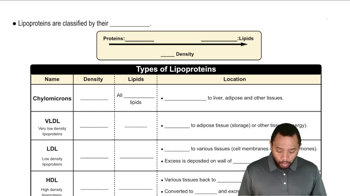Here are the essential concepts you must grasp in order to answer the question correctly.
Low-Density Lipoprotein (LDL)
Low-Density Lipoprotein (LDL) is a type of lipoprotein that carries cholesterol in the bloodstream. It is often referred to as 'bad' cholesterol because high levels of LDL can lead to the buildup of plaque in arteries, increasing the risk of cardiovascular diseases such as heart attacks and strokes.
Recommended video:
Lipoproteins for Transport Concept 2
Cholesterol Function
Cholesterol is a waxy substance that is essential for building cell membranes and producing hormones. However, the body needs a balance of different types of cholesterol; while some cholesterol is necessary for health, excess LDL can disrupt this balance and contribute to health problems.
Recommended video:
Atherosclerosis
Atherosclerosis is a condition characterized by the hardening and narrowing of arteries due to plaque buildup, which can be exacerbated by high levels of LDL cholesterol. This process can restrict blood flow and lead to serious cardiovascular issues, making the management of LDL levels crucial for heart health.
 Verified Solution
Verified Solution


 1:39m
1:39m
